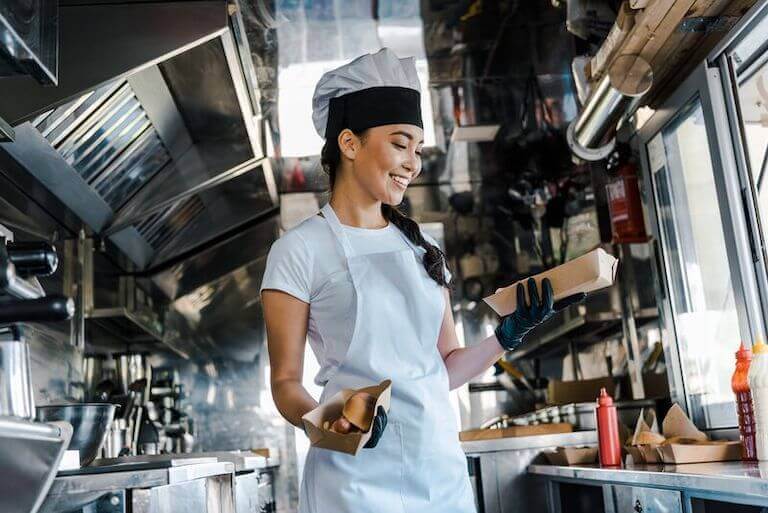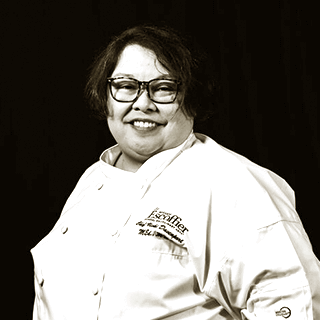As you immerse yourself in the art of crafting an aromatic Bouillabaisse or the alchemy of bread baking, your culinary school experience can be a canvas for dreams—dreams of becoming a renowned chef, running a fast-casual haven, or stepping into a hospitality manager role at a luxury hotel. But amidst these dreams, the question lingers: how will you get to that destination?
While the recipe for success can be multi-faceted, a fundamental ingredient stands out—the power of goal setting. Crafting a roadmap with small, yet achievable goals can not only boost your self-confidence as a student but fuel your ambition along the way. If you’re curious about why goal setting is important as a culinary student, you’ve come to the right place!
Why is Goal Setting Important?

The chances of achieving your goals are far greater if you write them down!
Chances are, you’ve probably heard of the law of attraction concept—a potent practice that can involve the articulation of your most vivid dreams, regardless of their scale, and releasing them into the universe! When you can visualize your goals and write them down, your brain will begin to work its magic— subconsciously scanning for the right opportunities as you navigate the world. While this might initially sound slightly mythical, the proof is in the pudding.
Dr. Gail Matthews, a distinguished psychology professor at Dominican University of California, conducted a famous study revealing a compelling truth: when you write down your goals and dreams, you can actually enhance your likelihood of achieving them. So we know that the act of goal setting may directly result in materialization, but what else can goal setting do for students while in culinary school?
Achieving Goals Can Bolster Your Self-Confidence
Whether your goal is to perfect your knife skills, graduate culinary school with honors, or find a suitable externship, actually achieving these goals can elevate your overall confidence. Based on a journal published by the American Psychological Association, goal setting can result in the E-E-E Model, which stands for Enlightening Us, Encouraging Us, and Enabling Us. This model also elucidates that goal setting may help us achieve a fine balance between our real and ideal selves. The moment we achieve a goal, we can regain our confidence, which enables us to continue seeking success.
Think about it, if you know each and every knife cut like the back of your hand, you may feel extra assured stepping into a line cook position after graduation. Or graduating with honors may give you the courage to apply to your “dream” position at a fine dining restaurant.
Goal Planning Can Promote Active Participation
If you have a clear roadmap, outlining your goals while in culinary school, you likely will know “what needs to be done” to take the next step. You’re then inspired to “take matters into your own hands” and seek the resources you may need to excel. This could be in the form of simply asking detailed questions in the classroom, so you can finish an assignment on time, or meeting with Career Services to plot an externship plan.
Setting goals as a student can breed the idea of taking initiative, which is a skill you can carry with you throughout your professional career.
Setting Goals Could Help Evaluate Progress
You may have heard of the “goal-setting theory,” which suggests that setting specific, yet challenging goals can accelerate your motivation. This can be viewed as the core foundation for SMART goals which stands for Specific, Measurable, Achievable, Relevant, and Timebound—a framework that can help evaluate your goal progress!
For example, as a student enrolled in Escoffier’s Food Entrepreneurship program, you might have a goal to complete a potential blueprint business plan for launching a food truck.

Establishing specific, yet measurable goals can help you map out your future, like launching a food truck!
Your SMART goal might look like this:
- Specific: My goal is to create a comprehensive business plan for a food truck to present in front of my Chef Instructor.
- Measurable: I’ll measure my progress by evaluating the completion of specific sections such as market research, menu development, financial projections, and marketing strategies.
- Achievable: I will complete my business plan within 60 days, which takes into account my part-time job and family obligations.
- Relevant: Completing the business plan is directly relevant to my educational and career goals of owning my own food truck after graduating from Escoffier.
- Time-bound: The goal has a definitive deadline of two months, providing a specific timeframe for completion.
As you can tell, creating clear, intentional goals can make it much easier to evaluate performance—another practical, lifelong skill!
Goal Setting Tips for Culinary Students
Now that you know the power behind goal setting and have a potential framework in mind, you might be brimming with excitement to begin defining your future goals! What key factors should you think about before you set sail on this goal-setting journey? Let’s dive a little deeper…
Consider Your Core Values
Taking the time to identify and understand your personal values and beliefs is just as important as the time you may spend honing your skills in the classroom or kitchen. Escoffier students can graduate with a range of competitive skills they can use in all sorts of culinary environments: Restaurants, food trucks, hotels, convention centers, and institutions…some even become personal or private chefs.
It’s important to realize that everyone might come to the table with different culinary goals. Some want to make their mark as culinary pioneers and run their own restaurants—happy to work unusual hours. Others may desire to maintain a more stable income in a Monday-to-Friday job, such as becoming a Restaurant Marketing or Finance Manager, which may provide the freedom to enjoy leisure or family time.
There’s no wrong or right path to follow; just make sure to identify your individual path by the time you graduate.

Considering your core values can propel you towards your goals, like becoming a restaurant manager!
You might pursue further education to specialize in a specific culinary niche such as plant-based cooking or decide to cook and travel…the possibilities are endless. Keep in mind that your culinary goals and aspirations may evolve over time as your knowledge, circumstances, or opportunities change. Try to be open to that change—you may have a solid education to back you up on this journey.
Continuously Challenge Yourself
Dr. Edwin Locke, the same psychologist who coined the goal-setting theory, wrote a highly informative paper in 1968 that addressed the concepts of motivation and incentives, and how they inspire action and growth. He suggested that the end goal isn’t necessarily the greatest motivator; it was the work itself that drove people to succeed. How does this relate to setting your culinary goals?
It might entice you to squash your fears to set lofty goals for yourself—like eventually working in a five-star restaurant. But it’s also just as effective to craft smaller goals. For example, figuring out ways to shave time off your mincing or chopping, or improving a dish you thought was too complex.
Challenging yourself with an everyday task you haven’t perfected yet may give you something to chase, even if that pursuit is simply refining a skill that might save you time and energy. You might reap greater rewards in your daily work life and grow as a culinary artist in this transformative process.
Experience Life Beyond the Kitchen
Don’t limit yourself to the kitchen when you’re building your foundation of knowledge. This is particularly important if you aspire to become an executive chef someday. Cooking skills are a must, of course, but it might be wise to also earn a food entrepreneurship degree or diploma, too.
You might find out if you have an aptitude for running your own restaurant—a new goal on your horizon if you have the intrinsic makings of an entrepreneur. You may not know unless you explore that option through further education.
It might be beneficial to experiment with other styles of cuisine from other cultures. Testing your ability to adapt to a new culinary style might enrich your life and possibly reveal a new skill you didn’t know you had until you tried it. It might make you a more versatile chef, as well, which may help with job prospects down the road.
Chart Your Future Culinary Course
Would you like to find out if a career in the culinary arts might be your “dream job,” or simply curious about how Escoffier’s programs can help you take the next step?
Contact us today to get one step closer to accomplishing your culinary goals. The journey to your dream job might start here!
DID YOU ENJOY THIS ARTICLE? THEN YOU’LL PROBABLY LIKE THESE ONES, TOO.
- How the Escoffier Alumni Association Can Transform Your Career Path
- How You Can Get into Culinary School
- Escoffier 101: Everything You Need to Know About Culinary School
*Information may not reflect every student’s experience. Results and outcomes may be based on several factors, such as geographical region or previous experience.


